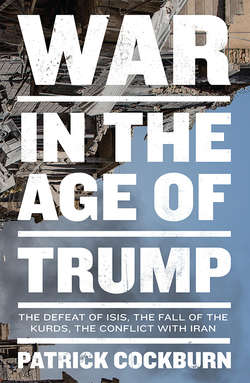Читать книгу War In The Age of Trump - Patrick Cockburn - Страница 14
На сайте Литреса книга снята с продажи.
ОглавлениеPART I. AN ISOLATIONIST IN THE AMERICAN TRADITION
I was in Erbil in northern Iraq in November 2016, covering the start of the siege of Mosul, when Donald Trump was elected US president. I had always taken his brand of American isolationism seriously during the campaign. I saw it as a very American type of populist nationalism that his multitude of critics in the US and the rest of the world found difficult to understand. Jingoistic in tone, laudatory of US military might, bursting with furious threats towards potential enemies—and frequently allies—it was also much against foreign wars and entanglements.
This bellicose bluster was to continue for the next three years, but at the time of writing, Trump has yet to start a war, though he has teetered on the edge of one with Iran. A hostile media and foreign policy establishment in Washington alternate between denouncing Trump as a warmonger, an appeaser—or a fool. Lost in this torrent of abuse is the fact that at the core of Trump’s foreign policy is a brutal realpolitik and a realisation where power actually lies. His decision, for instance, in October 2019 to withdraw US troops from north-east Syria was a betrayal of the Syrian Kurds and was announced in a chaotic manner. But he was correct in recognising, as his critics often did not, that the US military position in this isolated corner of Syria was weak, risky, and unsustainable. In the event, thanks to push-back by the Pentagon, Republican hawks, and his own neoconservative-dominated cabinet, US troops withdrew from Syria and then half-returned in a messy compromise between different forces in Washington.
The assassination of Iranian General Qasem Soleimani at Baghdad airport on 3 January did not denote a real change in this strategy of avoiding all-out military conflicts. Trump said that he gave the order to kill Soleimani to prevent a war and not to start one, though it could have had that effect. It could also have worked to the advantage of the government in Tehran as millions of Iranians rallied to mourn Soleimani and revile the US. But, at that very moment, Iran shot down a Ukrainian airliner, killing 176 people, and lied about it for three days. The popular backlash was no longer against the US but against their own government. Lost in all this was the fact that the US had allowed Iran to fire ballistic missiles at US bases at Ain al-Asad in western Iraq and Erbil in Iraqi Kurdistan and had not retaliated, a remarkable degree of restraint in the face of an undoubted act of war, masked by Trump’s belligerent rhetoric.
I had spoken to the leaders of pro-Iranian paramilitary groups in Baghdad in September 2019, and I could see that they believed that Trump would not act militarily against them or Iran. Their over-confidence stemmed from US lack of action over the previous summer, exemplified by Trump’s last-minute change of mind over launching US air strikes against Iran, after it shot down an American drone on 20 June 2019. He showed equal restraint on 14 September when there was an Iran/Houthi drone and missile attack on Saudi oil facilities. In both cases, his instinct against retaliating directly against Iran was correct. Had strikes against Iranian radars and missile batteries gone ahead in either case, what exactly would he have achieved? This sort of limited military operation usually works better as a threat than in actuality. The US was never going to launch an all-out war against Iran in pursuit of a decisive victory, as in Iraq in 2003, and anything less than that would create more problems than it would solve.
This calculation still makes sense: Iran would inevitably retain the ability after the air strikes to launch pinprick attacks up and down the Gulf and, above all, in and around the thirty-five-mile wide Strait of Hormuz, through which passes 30 percent of the world’s oil trade. Trump has chosen to rely on sanctions against Iran, re-imposed after he withdrew the US from the Iran nuclear deal in May 2018, that have devastated the Iranian economy. The US Treasury is a more lethal international power than the Pentagon, but what if the most rigorous sanctions do not force Iran to negotiate? Iran is likely to resume proxy attacks on US allies, because these are one of its few high-value cards in its confrontation with the US. Each phase of the crisis sees an escalation that brings a shooting war closer, though neither side wants one. A rule of Middle East politics is that every side overplays their hand at some point in the belief that they can win a complete victory. A compromise US-Iran deal is possible, but not if the US thinks it can force Iran to capitulate.
